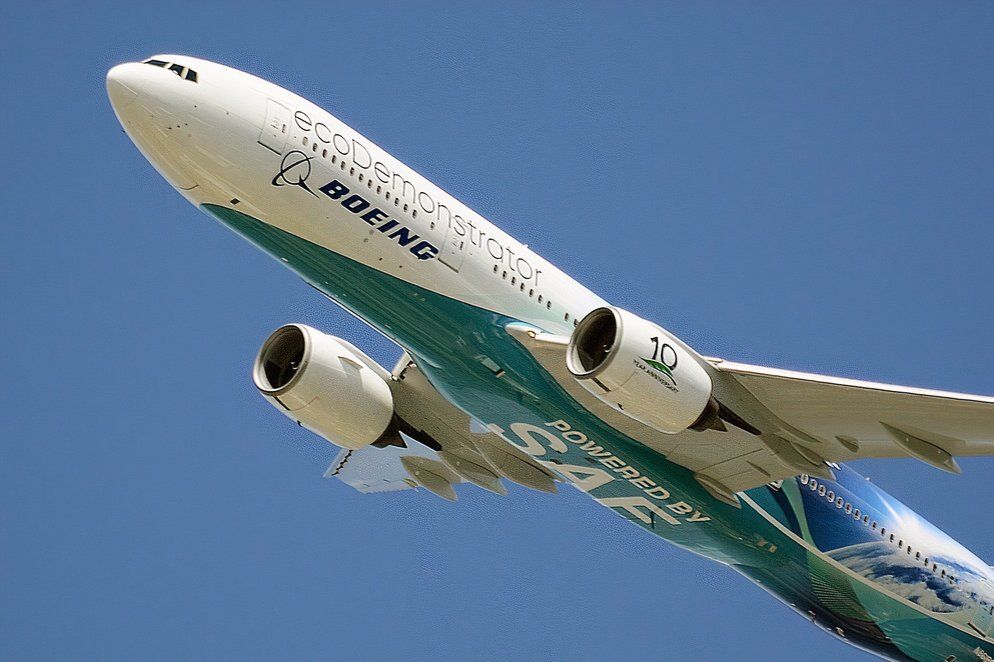Summary Boeing's goal of running production aircraft on 100% SAF by 2030 is a high bar, as no approved path currently exists for pure SAF commercial use. The company leverages its industry position to bring together partners and support research, development, and biofuel usage to drive sustainable aviation fuel production. Boeing's commitment to buying large amounts of SAF and working with competitors like Airbus underscores its role in promoting environmentally progressive policies worldwide.
Sustainable aviation fuel ( SAF ) is widely heralded as the solution with the greatest potential to help the aviation industry achieve net-zero carbon emissions in the immediate future. In contrast, more sustainable propulsion systems are being developed. While much progress has been made in developing SAF, it must still be blended with traditional jet fuel to fly commercially, and production lags significantly behind demand.

Getting SAF in the skies During a recent media tour of the Boeing facilities in Washington State, Simple Flying asked Jim Hileman, Boeing's Vice President and Chief Engineer of Sustainability Future Mobility, what the aircraft manufacturer was doing to encourage the development and use of SAF in commercial aviation. It turns out quite a bit. Want to know more about sustainability in aviation ? In 2021, Boeing publicly committed to ensuring that its production aircraft will run on 100% SAF by 2030.
This is an ambitious goal, seeing that there is currently no approved path to using 100% SAF. To make this a reality, the company is focusing on research and development, biofuel usage, industry partnerships, and policy advocacy. Aircraft manufacturers, in general, are uniquely positioned to help scale SAF production and adoption due to their unique relationships with airlines and stakeholders.
According to Hillman, Boeing is assisting companies to come together to reach industry-wide climate objectives by taking advantage of its position in the market to help catalyze SAF scaling: "With Boeing, we have a certain ability to convene people. We have the ability to bring people together, and we've actually been doing that over time. "We've now partnered with Wagner Group on sustainable aviation fuel production, and we're looking for others to partner with wherein we might be able to bring in a fuel buyer or an airline, a financier, the fuel producer, identify the local constraints, bring in a local government and bring our knowledge to power to get the right people together.
"Such that even if we never buy the fuel ourselves, we were instrumental in getting people together to make it happen This convening power has been used for over 15 years now, as the manufacturer has worked with a wide range of its customers and suppliers to encourage testing and certification. Getting the ball rolling In 2008, Boeing partnered with Virgin Atlantic and GE Aviation (now GE Aerospace ) to conduct the first commercial aviation flight using a biofuel blend of babassu oil and coconut oil mixed with traditional kerosene-based jet fuel. The flight was designed to highlight the technical feasibility of using biofuels in a commercial jetliner using one the most iconic ones ever produced, a Virgin Atlantic 747.
Two years later, Boeing partnered with the Navy to conduct SAF flight tests on an F/A-18 Super Hornet and with the Air Force on an in-depth fuel study as part of their efforts to certify the C-17 Globemaster to use SAF. By 2012, Boeing's ecoDemonstrator program began, utilizing existing aircraft to test new technologies, including flying on a SAF blend. Boeing uses its ecoDemonstrator program to make planes more efficient There have now been 11 ecoDemonstrator aircraft, ranging from a 787 Dreamliner to a FedEx Boeing 777F, which have collectively tested over 250 technologies.
One of the more recent examples is the Boeing ecoDemonstrator Explorer, a 737-10 destined for United Airlines. It flew on 100% SAF last year, with NASA's DC-8 Airborne Science Lab following behind to measure emissions. As the Explorer switched from 100% sustainable aviation fuel in one tank to conventional jet fuel in the other, the NASA chase aircraft followed behind in the contrails to measure and analyze the emissions.
Making the jump to 100% SAF Current standards only allow up to 50% SAF in commercial jet engines, and flights using pure SAF require special exemptions. The first such flight with a commercial aircraft was undertaken in 2018 on the FedEx Boeing 777F ecoDemonstrator, which used 100% SAF to power both of its engines on a flight from Seattle to Memphis. The first transatlantic flight using 100% SAF was only completed this past year, using a Boeing 787 Dreamliner operated by Virgin Atlantic.
The flight has been given a special number to mark the occasion. Boeing announced last year that its SAF Aircraft Compatibility Integrated Product Team had developed jet reference fluids (JRFs) with which to begin testing. One of the most significant challenges in certifying 100% SAF for commercial use is ensuring that biofuels function like traditional fuel .
Since the chemical makeup of SAF changes depending on the feedstock or biomass used and how it is refined, the reference fluids will help test how pure SAF interacts with airplane materials compared to petroleum-based jet fuel. The test results are being shared with ASTM International, the governing body responsible for developing the SAF standards. Have you heard the Simple Flying podcast recently? This ongoing research is not limited to the United States.
Earlier this year, Boeing opened a Research & Technology Center in Japan, home to its largest supplier base outside the US. There, a dedicated SAF engineering team further advances product compatibility work while supporting Japan in establishing a local SAF ecosystem. Walking the walk One of Boeing's most direct ways to drive SAF innovation is with its wallet.
Over the past two years, the company has agreed to directly purchase 17 million gallons (64.3 million liters) of blended SAF. SAF is significantly more expensive than traditional jet fuel, and stimulating production is vital to driving consumer prices.
Numerous operators have raised issues with the price of sustainable fuels. Get the latest aviation news straight to your inbox: Sign up for our newsletters today. According to the International Air Transport Association (IATA), SAF production is set to triple to 1.
9 billion liters (1.5 million tonnes) this year, but that will still only account for 0.53% of aviation's fuel needs for the year.
Speaking recently at the Farnborough International Airshow 2024 , Brian Yutko, CEO of Boeing eVTOL subsidiary Wisk, noted Boeing is pursuing multiple paths to encourage innovation in the sector: "At Boeing, we're not an energy company, but we have an important role to play on scaling SAF, and it's three fold. First, we've got to get the airplanes ready - 100% SAF compatible, etc - and we've been working on this since 2008. "Second is we buy SAF for our use to send a demand signal into the market.
This year, we bought 50 million liters of SAF. That's 20% of our own fuel use. So that's far above the 0.
1% that you're seeing out there. So it's our role to, in many ways, put our money where our mouth is. "Third, it's about striking new partnerships, catalyzing SAF around the world, and stimulating roadmaps and feedstock studies to help scale.
" To that effect, the company is exerting its significant political and financial influence to promote environmentally progressive policies. To encourage SAF production and adoption worldwide, Boing continues to work with consulting firms, academic institutions, and non-profit organizations to conduct studies in more than a dozen countries to identify viable pathways for locally produced SAF using local feedstock solutions. A Boeing executive among others believes in Brazil's future role as a leader in SAF production.
Boeing is even working with its primary rival, Airbus , on sustainable aviation fuel. The two companies are leading the International Aerospace Environmental Group's Work Group 13 to evaluate technical issues regarding the compatibility of 100% SAF in airplane systems with the likes of Dassault Aviation, GE Aerospace, RTX's Pratt & Whitney, Rolls-Royce, and Safran..



















